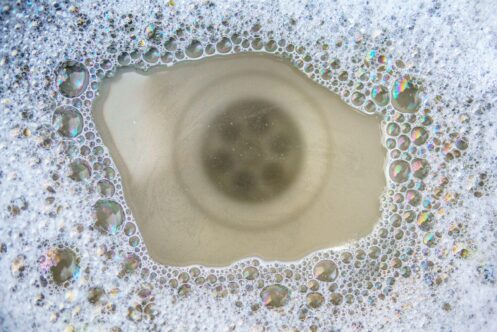Enzyme vs. Chemical Drain Cleaners: Which Is Safer and More Effective?

When many homeowners encounter a clogged drain, they instinctively reach for the closest bottle of drain cleaner. Unfortunately, not all products are made equally. Choosing between chemical and enzyme drain cleaners is a decision that has a lasting impact on the environment, your household health, and your home plumbing system.
Read this guide from our plumbing services experts on the pros and cons of each type, and the verdict on which is best.
How Chemical Drain Cleaners Work
Chemical drain cleaners are usually made using potent acidic or alkaline compounds, such as sulfuric acid or sodium hydroxide, also known as lye. These ingredients are formulated for aggressive reactions with organic materials, such as grease, hair, and soap scum. When they break down clogs, they generate heat through their chemical reactions, which can expedite the process.
The advantages of chemical drain cleaners include their fast-acting nature, wide availability, and effectiveness in addressing basic blockages. They’re powerful enough to clear dense clogs with enough time, though they won’t entirely remove them. You can find them in most grocery and hardware stores, and they clear minor clogs in just moments.
For all their benefits, it’s essential to be aware of their potential drawbacks, including pipe corrosion, health hazards, and environmental concerns. Toxic ingredients might harm water supplies and septic systems. Splashes and fumes may irritate the lungs, eyes, and skin. Repetitive use might damage older plumbing, metal, and PVC materials.
What Are Enzyme Drain Cleaners?
Enzyme-based cleaners operate differently. Instead of using harsh chemicals, natural bacteria and enzymes digest the organic material stuck in your drains. These are biological agents that “eat” substances, such as hair, grease, and food particles, over time. They’re a gentler option for both the planet and your home plumbing.
The benefits include no corrosive damage, eco-friendly composition, and suitability for routine maintenance. They work well in keeping drains clear over a long period, and they’re non-toxic and biodegradable. There shouldn’t be any corrosive damage.
Unfortunately, they generally have slower results; you need to use them regularly, and they’re not as effective on severe clogs. They don’t have enough power to tackle blockages resulting from accumulations of inorganic materials, nor do they work on buildup that’s deeper in the line. Even for clogs and blockages that they can handle, enzymes need hours or even overnight to work effectively. They’re best used in a preventative fashion instead of reactively.
Which Option Is Safer for Your Home?
Enzyme cleaners are the definitive winner in terms of safety. Chemical cleaners pose numerous risks, particularly in homes with children or pets. Improper use can cause respiratory irritation, chemical burns, and hazardous interactions with other household products, particularly bleach.
On the other hand, enzyme cleaners are typically safe for use around the home and non-toxic. They don’t damage pipes and fixtures or produce dangerous fumes. Enzyme-based products are the right move if you prioritize sustainability and safety.
Tips for Safe and Effective Drain Cleaning
Despite the risks, chemical cleaners can be suitable for severe clogs that require immediate attention. A carefully applied chemical solution can quickly restore function if you have a shower or sink backing up and you can’t wait for enzymes to work.
Use enzyme cleaners for ongoing maintenance on a weekly or monthly basis to prevent accumulations of organic material in garbage disposals, bathroom drains, and kitchen sinks. Their natural bacteria can help break down waste in homes with septic systems.
Always read the labels and follow the instructions closely for both kinds of cleaners. Flush thoroughly with hot water to remove residue, and avoid mixing cleaners, especially chemical options. Try mechanical methods first when possible; drain snakes, plungers, and manual removal solve many clogs without needing cleaners at all.
The Bottom Line: Choosing the Right Cleaner
When comparing chemical vs. enzyme cleaners, it’s essential to recognize that there’s no single solution that fits all situations. Chemical cleaners are fast and powerful, but they pose risks to the environment, your plumbing, and the health of your household. Enzyme cleaners work more slowly, but they’re safer and well-suited for routine maintenance.
You can use a chemical cleaner for a quick fix in a pinch; however, plumbers really discourage this. For ongoing safety and care, enzyme-based cleaners are a greener, more innovative solution. Ideally, your home will maintain both options, with everyone knowing when and how to apply each responsibly.
When to Skip Chemicals and Go Mechanical
If you’re seeing repeated slow drains, gurgling at multiple fixtures, or backups on the lowest level, the issue may be in the main line. In these cases, liquid cleaners won’t reach or resolve the obstruction and can sit in the pipe creating heat and risk. Mechanical clearing methods (snaking or water jetting) physically remove buildup so flow returns to normal.
What to Watch For Before a Professional Visit
- Note which fixtures clog first and whether the toilet bubbles when other fixtures drain.
- List recent changes like heavy cooking grease, wipes, or a new disposal that could add solids.
- Avoid mixing different chemical products; do not plunge after chemicals have been used.
If you suspect scale, grease, or intrusive roots, a camera inspection and jetting are often the most efficient path. Learn about high-pressure water jetting options here: Hydro-Jet Plumbing in Urbana. If aging or damaged pipes are part of the problem, spot repairs may be the safer long-term fix: Pipe Repair in Urbana.
Consult With the Drain Cleaning Experts
Dogtown Heating, Air & Plumbing offers plumbing services to residents of Urbana, Paxton, and the surrounding areas. Our services include drain cleaning as well as plumbing installations, repairs, hydro-jetting, and garbage disposals. Contact Dogtown Heating, Air & Plumbing for all your household’s drain and sewer needs.

